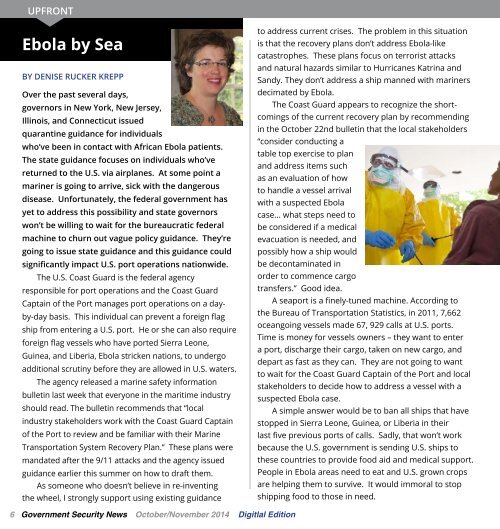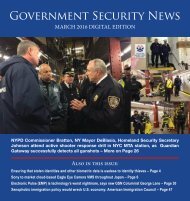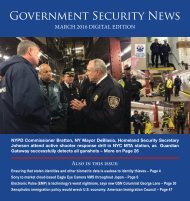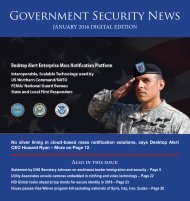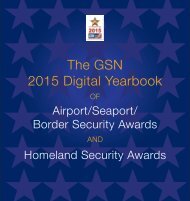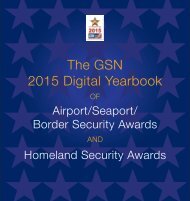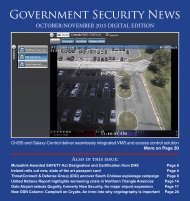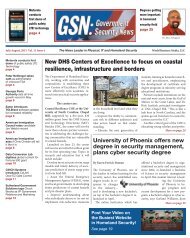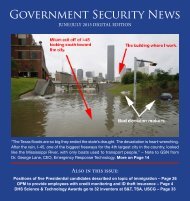GSN 2014 October/November Digital Edition
Government Security News
Government Security News
Create successful ePaper yourself
Turn your PDF publications into a flip-book with our unique Google optimized e-Paper software.
UPFRONT<br />
Ebola by Sea<br />
BY DENISE RUCKER KREPP<br />
Over the past several days,<br />
governors in New York, New Jersey,<br />
Illinois, and Connecticut issued<br />
quarantine guidance for individuals<br />
who’ve been in contact with African Ebola patients.<br />
The state guidance focuses on individuals who’ve<br />
returned to the U.S. via airplanes. At some point a<br />
mariner is going to arrive, sick with the dangerous<br />
disease. Unfortunately, the federal government has<br />
yet to address this possibility and state governors<br />
won’t be willing to wait for the bureaucratic federal<br />
machine to churn out vague policy guidance. They’re<br />
going to issue state guidance and this guidance could<br />
significantly impact U.S. port operations nationwide.<br />
The U.S. Coast Guard is the federal agency<br />
responsible for port operations and the Coast Guard<br />
Captain of the Port manages port operations on a dayby-day<br />
basis. This individual can prevent a foreign flag<br />
ship from entering a U.S. port. He or she can also require<br />
foreign flag vessels who have ported Sierra Leone,<br />
Guinea, and Liberia, Ebola stricken nations, to undergo<br />
additional scrutiny before they are allowed in U.S. waters.<br />
The agency released a marine safety information<br />
bulletin last week that everyone in the maritime industry<br />
should read. The bulletin recommends that “local<br />
industry stakeholders work with the Coast Guard Captain<br />
of the Port to review and be familiar with their Marine<br />
Transportation System Recovery Plan.” These plans were<br />
mandated after the 9/11 attacks and the agency issued<br />
guidance earlier this summer on how to draft them.<br />
As someone who doesn’t believe in re-inventing<br />
the wheel, I strongly support using existing guidance<br />
to address current crises. The problem in this situation<br />
is that the recovery plans don’t address Ebola-like<br />
catastrophes. These plans focus on terrorist attacks<br />
and natural hazards similar to Hurricanes Katrina and<br />
Sandy. They don’t address a ship manned with mariners<br />
decimated by Ebola.<br />
The Coast Guard appears to recognize the shortcomings<br />
of the current recovery plan by recommending<br />
in the <strong>October</strong> 22nd bulletin that the local stakeholders<br />
“consider conducting a<br />
table top exercise to plan<br />
and address items such<br />
as an evaluation of how<br />
to handle a vessel arrival<br />
with a suspected Ebola<br />
case... what steps need to<br />
be considered if a medical<br />
evacuation is needed, and<br />
possibly how a ship would<br />
be decontaminated in<br />
order to commence cargo<br />
transfers.” Good idea.<br />
A seaport is a finely-tuned machine. According to<br />
the Bureau of Transportation Statistics, in 2011, 7,662<br />
oceangoing vessels made 67, 929 calls at U.S. ports.<br />
Time is money for vessels owners – they want to enter<br />
a port, discharge their cargo, taken on new cargo, and<br />
depart as fast as they can. They are not going to want<br />
to wait for the Coast Guard Captain of the Port and local<br />
stakeholders to decide how to address a vessel with a<br />
suspected Ebola case.<br />
A simple answer would be to ban all ships that have<br />
stopped in Sierra Leone, Guinea, or Liberia in their<br />
last five previous ports of calls. Sadly, that won’t work<br />
because the U.S. government is sending U.S. ships to<br />
these countries to provide food aid and medical support.<br />
People in Ebola areas need to eat and U.S. grown crops<br />
are helping them to survive. It would immoral to stop<br />
shipping food to those in need.<br />
If the U.S. can’t ban all ships that have ported in<br />
Ebola-stricken countries, then the U.S. Coast Guard must<br />
develop a more comprehensive plan to address the<br />
possibility of Ebola victims arriving in the U.S. by sea. The<br />
agency can’t merely recommend that local stakeholders<br />
conduct table top exercises. These exercises should be<br />
mandatory and the Coast Guard must be ready to provide<br />
substantive guidance.<br />
Keeping in mind that several governors have already<br />
issued isolation guidance for air travelers, the Coast Guard<br />
must work the governors now to address the maritime<br />
sector. How are sick mariners evacuated? At sea via<br />
helicopter or a smaller vessel? At the port by ambulance?<br />
How is the vessel decontaminated? How and when are<br />
the necessary personnel going to be trained to carry<br />
out the evacuation and decontamination procedures?<br />
What happens to the other in-coming vessels during the<br />
decontamination process? If the Coast Guard can’t answer<br />
these questions, the state governors will because they<br />
won’t their ports contaminated with the Ebola virus. Ports<br />
bring in revenue and the revue can’t drop.<br />
The Coast Guard prides itself on being Semper<br />
Paratus. Now, more than ever, it must live up to its motto.<br />
The nation’s ports can’t be shut down because of Ebola<br />
and they won’t be if the Coast Guard develops more<br />
comprehensive guidance before the first ship arrives.<br />
Pre-planning with local stakeholders, including governors,<br />
will ensure that the country’s supply chain continues to<br />
operate. Call your local Captain of the Port and ask him<br />
or her to schedule the table top exercise. Ω<br />
PHYSICAL SECURITY<br />
with COMPLETE PERIMETER CONTROL<br />
ANTI-CLIMB FENCE RETRACTABLE WEDGES ANTI-RAM FENCE SECURITY BOLLARDS<br />
Call our perimeter security specialist at 866-467-2773 and visit us online at ameristarsecurity.com<br />
6 Government Security News <strong>October</strong>/<strong>November</strong> <strong>2014</strong> Digitlal <strong>Edition</strong> Digitlal <strong>Edition</strong> <strong>October</strong>/<strong>November</strong> <strong>2014</strong> Government Security News 7


